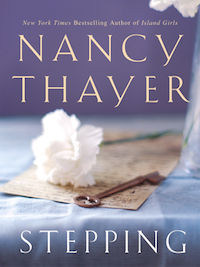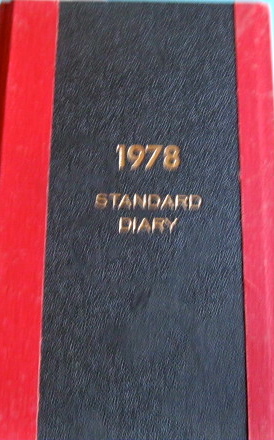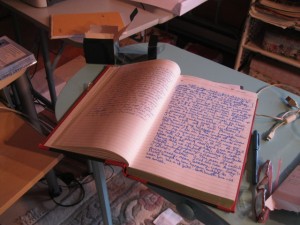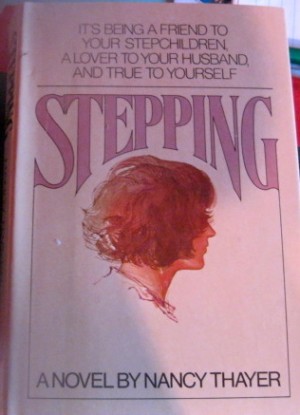YOUR LIFE IS NOT A NOVEL
OR MAYBE IT IS!
I’ve always wanted to write about the lives of “ordinary” women, and I have done this, partly by using bits of my own life or actual episodes for inspiration. Through the years, I’ve kept diaries full of seemingly insignificant detail, and on this windy Monday, I’m looking through my diaries. I want to tell you how I discovered the idea for my first published novel.
I don’t suppose hundreds of women have married older vaguely-Germanic professors because Jo did in Louisa May Alcott’s Little Women, but I’m sure dozens have. I’m one of them.
When I was twenty, I ran away from my home and my family in Wichita, Kansas to marry my sixteen-years-older, vaguely-Germanic psychology professor. It was exciting, glamorous, romantic. I felt like I was in a novel, maybe even a screenplay.
Because my husband liked to travel, I lived for a semester in France, and in Amsterdam, and in Finland – also in Kansas City, Iowa City, Milwaukee, and Vancouver. For over a decade, I taught freshman English in colleges, read books, and tried to write.
In 1978, I began writing a novel called Stepping, about a woman with two stepdaughters, two small children, a professor husband, and an almost lover. The woman’s cooped up in an apartment in Helsinki without a television, radio, record player (yes, it was 1978), or toys, and her husband is always off being feted for being a Fulbright scholar. A lot of the novel was autobiographical, but a lot of it was not. I did have two stepdaughters (who by then were grown), two small children, and a professor husband but I certainly had no almost lover. I invented him to add spice and drama to the less sexy themes of domestic difficulties.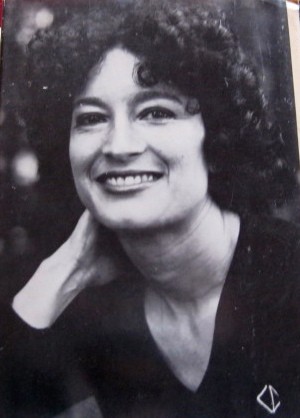
As it turned out, people loved Stepping because the scenes of domestic difficulties were honest and often funny, in that so tired-you’re-hysterical way. Stepping was published the year I was divorced from my husband. Zelda, the main character in Stepping, was like me, only better. She was funnier, nicer, and she remained married to her husband. I was cranky, terrified about money, and about to be divorced. No one would ever confuse my novel with my diary.
Today I took out my 1978 diary to see what was going on January 10. I was living alone with the children then. Here’s what I wrote:
I wrote! Lovely! Josh A- over to play with my Josh. Then Marigold came with her three children, then Jane W- and her children. Wine in the kitchen, children bouncing on the beds, laughter everywhere. Very nice.
The next day, I wrote:
Started on Chp. 7—it’s going well. Mailed off the short essay—it cost me $1.25 in postage! Merry & Dina came over for dinner. Dina told us about Ned. T.—the irresistibly handsome guy who works at the greenhouse. He told Dina all the women take plants in to him and say, “My begonia’s sick and by the way, my marriage is a disaster.” We screamed with laughter.
During those days, in that same diary, I also wrote:
I’m full of despair about my marriage and money, but at least it’s the quiet kind. So guilty, bad Nancy, to spend $15 on this monstrous big diary, but all the others were too small and I have so much to say. Both children had burning stinging bums that made them whiny and cranky and finally awful yucky poops. They’re okay now. We are all so tired.
I’m not sure now what the quiet kind of despair was for me—probably meant that I didn’t yell and burst into tears in front of at the kids.
Writing my first novel was not like writing a diary. It involved much sifting, judging, and omitting. That part wasn’t easy. . .it was rather like remembering a frightening car crash in which everyone lived.
And that was just the beginning. I had to dig deep to find the heart of the book. Then came the writing—the selecting, inventing, shaping and molding. The diary was written in passion and in haste. The book required cool, cerebral attention, long hours bent over my electric typewriter. I needed to use all the skills I’d learned while getting my bachelor’s and master’s degrees and while reading the countless novels I’d read over the years. It required dozens of rewrites. It was never an autobiography: it was a novel.
My first published novel!
Next Monday, I’ll write about how the reaction to Stepping shaped my future. Until then, it’s available, every carefully chosen word, in ereader form.
